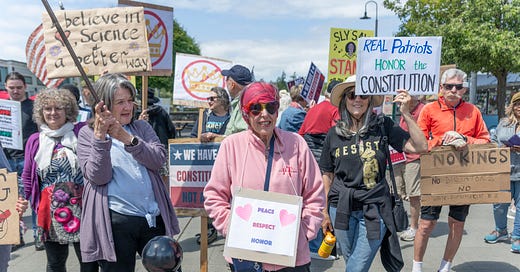The courage to stand up and the duty to bear witness
Why Saturday’s “No Kings” marches matter for every reporter, reader, and citizen.
Nearly 220 of our neighbors crowded into La Conner’s Gilkey Square on Saturday, holding up handmade placards and waving to passing cars. They were hardly alone. As I write this, the national count of “No Kings” protesters is topping 11 million, including the thousands who lined up along Commercial Avenue in Anacortes and Burlington Boulevard in Burlington and the 150 who took to the streets in tiny Stanwood.
It felt like if you stepped outside anywhere in Skagit County on Saturday, you were bound to run into people exercising one of our most precious — and most contested — liberties: the rights enshrined in the First Amendment.
Congress shall make no law respecting an establishment of religion, or prohibiting the free exercise thereof; or abridging the freedom of speech, or of the press; or the right of the people peaceably to assemble, and to petition the Government for a redress of grievances.
Those 45 words fuel every edition of La Conner Community News I send to press and undergird every question I’ve ever lobbed at a public official. They also protect the logger chaining himself to a Douglas fir, the WTO critic chanting in downtown Seattle, the pro-gun contingent rallying on the Capitol steps, and the last gasps of Aryan Nations marching through Coeur d’Alene. I’ve interviewed each of them over the last three decades and fully appreciate that their right to speak is inseparable from my right to report.
Threats to protest are threats to the press
When officials or vigilantes threaten demonstrators — arrests for blocking sidewalks or branding peaceful gatherings “un-American” — they don’t just muzzle dissent. They corrode the foundation that lets journalists:
Ask why citizens feel unheard.
Document how authorities respond.
Publish uncomfortable truths without fear of reprisal.
If protesting is painted as perilous, reporting on protests quickly follows. The same intimidation that silences a marcher on Gilkey Square can silence the photographer beside her.
Our small-town imperative
Running a startup paper in a rural valley, I’m painfully aware I could lose readers and advertisers whenever I cover a demonstration. But journalism isn’t a popularity contest. It’s a mirror. Some days it reflects bouquets; other days it reflects barricades. Our job is to keep the mirror polished, no matter who dislikes the image.
Most residents will never write legislation or helm a newsroom. Marching down Main (or Morris) Street with a cardboard sign may be their single blunt instrument of democracy. That is courage. Meeting that courage with curiosity, not contempt, is the minimum our profession demands.
A call to readers and fellow reporters
If you marched Saturday, know that your presence strengthened the rights you and I both depend on.
If you stayed home but value an unfettered press, insist on coverage, even when the crowds clash with your own views.
And if you hold a press badge, remember: omitting public passion because it ruffles feathers is itself a bias — one against truth.
The First Amendment binds us together in an uneasy, glorious knot. Protesters tug one strand, publishers another, critics a third. The tension keeps the republic upright. Let’s not allow fear — or fatigue — to loosen it.




